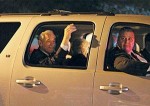Students observe candidates as campus liaisons

Waiting in the Marshall Student Center (MSC) Monday night, Briana Jones could hear political protesters demonstrating outside the NBC Republican Presidential Candidates Debate. It made her nervous.
“Please protect me,” Jones said to a police officer standing nearby. Though the officer said he would help her, Jones herself was there to help another — candidate Rick Santorum.
Jones, a senior majoring in health science and director of University and Community Affairs for Student Government (SG), was one of four SG members who served as liaisons to the four candidates — Mitt Romney, Ron Paul, Newt Gingrich and Santorum — during the debate.
At first, sharing an MSC elevator with Santorum was “a little awkward,” she said.
“I complimented him on his cowboy boots and he said, ‘Thank you,’ and smiled about that, but everything else was (said) with a stern face,” Jones said. “I was like, ‘OK, I’m not going to say anything else to this man.'”
Jones was tasked with helping Santorum and his staff navigate the MSC, as well as remind them of their itinerary. From the time she met Santorum at 7:45 p.m. to the time the candidates left the debate, which began at 9 p.m., Jones stuck around the campaign. After the debate, she said she was introduced to a different Santorum than the austere face in the elevator.
“He seemed a little — very — detached and he wasn’t friendly at all,” she said of Santorum’s pre-debate demeanor. “And I found out afterward, when he returned to the (green) room (on the third floor of the MSC), he was nervous. And it was just a complete change in pace when he got back (from the debate). When he got back, he was talking. He was talking about the Bulls. He was saying all types of stuff.”
Jones said the post-debate atmosphere in the Santorum campaign was triumphant.
“When he got back to the room, his whole staffing team told him how great of a job he did and, of course, they were saying what they thought the other candidates didn’t do well, and stuff like that,” she said. “But they were just buttering him up, because it wasn’t that great. I don’t know, the debate wasn’t that captivating that it would have made me react that way. But I guess that’s what they get paid to do, and they did a good job of buttering him up when he got back.”
Brian Goff, SG attorney general and a junior majoring in biochemistry, served as the liaison for Romney’s campaign but never got a chance to meet Romney himself, whom Goff heard was a pre-debate isolationist.
But even without meeting the man behind the campaign, Goff said he could tell a lot about each candidate by the staffs they chose to surround themselves with.
“I was very surprised by how focused (the Romney staffers) were — almost like tunnel vision sort of. They were very goal oriented,” Goff said. “There was a very big contrast from that campaign to the Paul campaign, where you could hear there was a lot of laugher and joking and not too much of an air to it. Juxtaposed to the Santorum campaign, where everyone was on pins and needles, analyzing, watching every move.”
Goff said he and a few lower-level members of Romney’s campaign were periodically asked to leave the green room while the team strategized. But Jones saw him waiting in the hallway and invited Goff into Santorum’s greenroom, where Goff stayed briefly before spending a few minutes in the Paul green room.
Rachel Brown, Senate pro tempore and a senior majoring in accounting, said her first task as liaison for the Paul campaign was to meet the candidate’s motorcade in the MSC loading dock and escort his wife and family to the campaign’s green room. It was a while longer before she met Paul himself.
“He had gone to makeup and I had taken one of his aides down to the (Media Center) Spin Zone, and when we came back, he was still in makeup and we were in the green room and I was telling his aide how excited I was to meet him and how surreal the entire experience was,” Brown said. “And she’s just like, ‘Well, there’s Dr. Paul now.’ And I just turned around and across the conference table there’s Ron Paul, the presidential Republican primary candidate, and it was just insane.”
Brown said Paul and his staff were “so impressed” and “grateful” for the support they received on campus.
“When they drove up, they were just beaming when they got out of the car,” she said. “They really wanted to go down to the (watch party) tent and meet some of the students, but because it was such an open area, there were security concerns.”
Brown said she would have been willing to volunteer with any of the four campaigns but was especially happy to be paired with Paul, whom she and her family support. She was invited to accompany the candidate to Copper Top Pub after the debate, but said she was too tired to go.
William Warmke, SG solicitor general and a junior majoring in political science and criminology, also got an opportunity to engage with a candidate he is “a fan of” — Newt Gingrich.
“(We spoke) for, maybe, like 20 seconds,” Warmke said. “But it felt like hours speaking to him … just because of all the thought you put into talking to a candidate.”
Warmke said interaction with Gingrich was “really minimal.”
“He was definitely tense,” he said. “You could tell he was mentally preparing for the debate because his mind was elsewhere … It was almost surreal. I was interacting with, possibly, one of the future presidents of the United States.”






